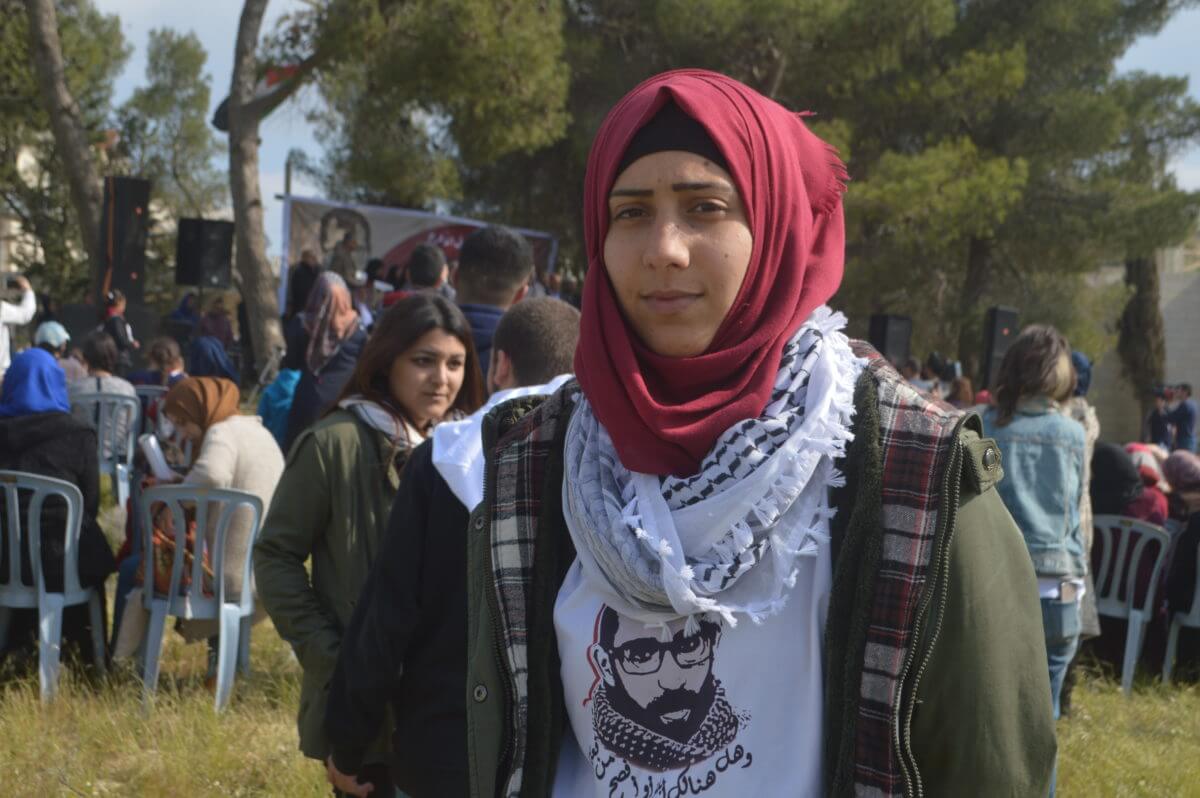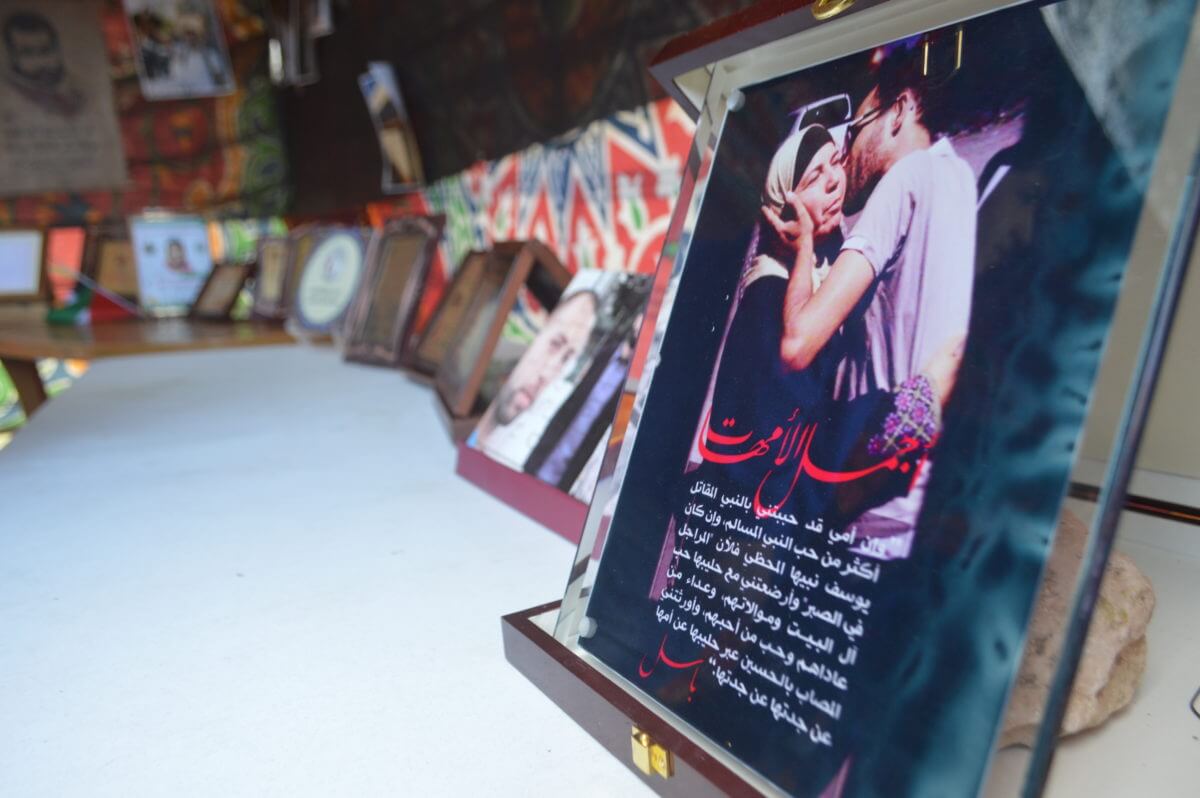Less than two months after his death, the image of Basil al-Araj, clad in a red checkered keffiyeh loosely wrapped around his neck and thick black-rimmed glasses settled over a thoughtful expression, has become iconic. Palestinian youth have swapped their profile-photo-selfies for the slain leader’s image across social media circles. The image appears on local artwork, graffiti murals, t-shirts and posters from Haifa to Hebron.
Before the circumstances that led to his death, many had never heard of the man now referred to as just “Basil” in political discourse. For a generation fed up with traditional politics, Basil’s grassroots ideology, and the shocking story of his death have injected a bit of life into Palestine’s intellectual movement.
In April 2016, Basil and five others were detained by the Palestinian Authority for allegedly possessing illegal weapons and planning to carry out an attack on Israelis. Although the group was not charged, they were held for six months by the PA. When Basil was released he nearly immediately went on the run from Israeli forces, who had detained the five others who had been in PA prison with him.
On March 6, 2017, Israeli forces discovered where Basil had been hiding out, and stormed the building. An exchange of fire reportedly took place for two hours. Though no Israeli soldiers were injured in the firefight, Basil was shot dead.
Anwar al-Araj, a 21-year-old university student and a close cousin to Basil, told Mondoweiss that she has been overwhelmed with evidence of Basil’s growing popularity amongst Palestinian youth.
“The biggest evidence that Basil’s ideology has had an effect on the Palestinian people starts with the social media, it shows all the people that are sympathizing with Basil. His ideology is being distributed all over the internet,” Anwar said. “Also, we saw at his funeral, thousands of people came from all over the West Bank and Palestine to participate and to show that Basil wasn’t going alone, the people have so much support for him.”

Before the year of imprisonment and hiding that eventually led to his death, Basil had been forming a fledgling movement. Though Palestinian youth say they are inspired by Basil and his beliefs, they reject the concept of his ideology being used to create a new political party. Many of the young philosopher’s followers are attracted to Basil’s ideas because they have become disillusioned by the Palestinian political system, and they hope to keep the momentum his ideology has gained in his death organic by remaining disorganized.
“As a group of youth following the ideology of Basil, we will stay true to his beliefs. As far as the family — the cousins and friends that were close to him — we don’t believe in forming a political party in his name,” Anwar said. “Maybe in the future his ideas can morph into a political party of sorts, but as the original group of Basil’s friends and followers, we don’t think that’s the path to take, because we don’t want to stray from what he would have wanted. Basil didn’t believe in creating a political party from his ideology, he believed in creating a way of thinking, a set of ideas, but organizing in the way of a political party is not what we feel he would have wanted.”
Amjad Alqasis, an adviser at Al Haq Center for Applied International Law, told Mondoweiss that he believes this rejection of tradition political organization stems from a deep frustration felt by youth in regard to local politics.
“I think that on one hand youth in Palestine and young people especially are very frustrated from their political leadership, so this plays an important role — they don’t want to follow in their footsteps by engaging in the traditional political discourse,” Alqasis said. “And also, on the other hand, I see a complete lack of political leadership in Palestine, and that doesn’t motivate people to join a political party, or to even form a new political party — this is a big problem.”
Alqasis said he also observed a broader way of thinking among the youth, who are perhaps less interested in engaging in politics that don’t represent the entirety of the Palestinian population, globally.
“When you look at the Palestinian Authority, it is only able to, at best, represent Palestinians living in the occupied territory, so East Jerusalem, the West Bank and Gaza. But they lack any mandate to represent those living in Israel, or the millions living in exile,” he explained. “The majority of Palestinians live in exile, and while the PLO was able to represent all Palestinians worldwide, the PA on the other hand only represents one group of the three main groups of Palestinians, so this is also why young people see no sense in starting a political party in the occupied territory where they could only hope to represent such a small fraction. Many young people would be more interested in being part of a larger movement, a movement trying to encompass all Palestinians everywhere.”

Mohammed Shahada, 27 and a friend of Basil’s from his hometown of al-Walaja, told Mondoweiss that while he agrees that Basil’s supporters should not attempt forming a political party under his ideology, he does believe the spread of Basil’s ideas could change Palestinian politics.
“Not at an authority level, but from the street, from these people,” he said, motioning at the crowd of hundreds who gathered in Basil’s hometown for a traditional memorial ceremony. “My little cousins are ten, eleven and eight years old, they hear our conversations and now they have started to read, they started to ask me about different books, about the books Basil used to read. They start to ask, and that’s the first step, that’s how Basil was, he asked questions — Why did this happen to us, why did this happen to my village and my people? And the kids are taking the same step, they have started to ask, and this is a very important thing.”
Forty days after the death of a person deemed a martyr by Muslims, as Basil is, a memorial festival known as “Ta’abeen” is held. Standing in a grassy field on the edge of Israel’s separation wall in the Bethlehem-area village of al-Walaja, one could mistake the gathering for a music festival.
Hundreds took part in the memorial, where participants gave speeches, played music and read poetry dedicated to Basil.

In a small tent lined with photos of the slain philosopher, Basil’s image came to life on a projection screen. Posters featuring his now iconic image next to the full text of his last will were handed out as keepsakes.
Youth sat in circles in the grass around the rows of hundreds of plastic chairs lined up in front of a large stage. T-shirts with images of Basil, Che Guevara and Ghassan Kanafani and red leftist Keffiyehs were the fashion of the day for the alternative youth in the crowd.
“Everyone talks about him now,” Shahada said. “When he died people went to the streets in Palestine, and not just in Palestine actually, online we saw people protesting in Jordan, Syria, Egypt, Tunisia, Turkey — even in the US. In New York and Chicago there was a memorial for him. We can say Basil is becoming a global icon.”
The ideas he established as a basis for his ideology are not new in the revolutionary sense, as they were formed through years of studying leftists and pan-Arab movements, as well as the history of colonialism and resistance.

“Basil graduated from Egypt, and he was really affected by Egyptian ideology and politics, especially Gamal Abdel Nasser,” he said, referring to the mid-20th-century president of Egypt, with socialist pan-Arab beliefs. “During his studies he was also affected by songs from Sheikh Imam, who sang all about politics, nationalism and resistance.”
Shahada said he knew Basil to always be reading a book and traveling around the occupied West Bank, taking other youth with him to learn and teach about Palestinian resistance history.
Basil found it important to weed out the faults made in history, so as not to repeat them.
“During his studies he did a lot of research on resistance history and the international struggle for rights and he tried to discover the weak points that the Palestinian resistance has had in the past — the mistakes that Palestinians made during the history of our resistance and national liberation movement — he wanted to study the history so he could make a new plan for us,” Shahada said. “He was really against the idea of being a just a philosopher, he insisted that the ideas he was forming should be practical. He thought people should go to the field and take action and that’s how he died.”



sana musa “thread of the morning”, like Basil she has that natural dignity, just wonderful, elsewhere she does the famous lullaby written by a Palestinian called Kurdi, wi’youniha its a pretty nursery tune.
https://youtu.be/FvhU4A3Qp5c
Why are we not getting clear talk here?
Al Araj was a resistant murdered by the US-Zionist puppets working as Zionist police of the Palestinians, doing business as PA.
I suppose the author could not say it even if she wanted to. Not so for us, away from the region.